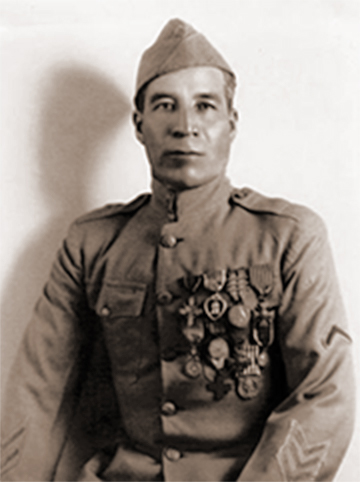Pvt. Marcelino Serna
USCIS El Paso Field Office

Private Marcelino Serna was born at the Hacienda Robinson mining camp outside Chihuahua City, Mexico on April 26, 1896. In 1916, when he was 20 years old, he came to the United States. He served as a member of the maintenance crew for two railroad systems and worked as a farmhand in Colorado.
The United States declared war on Germany on April 6, 1917. That same year, federal officials detained a group of young men until their draft status could be verified. Rather than wait, Private Serna voluntarily enlisted in the U.S. Army. After three weeks of training at Camp Funston, Kansas, he deployed to France with Company B, 355th Infantry, 89th Infantry Division.
Upon learning Private Serna was not a U.S. citizen, his commander offered to discharge him. He declined, reportedly saying, “I told the captain I wanted to stay with my buddies, and he told me it would be okay.”
In September 1918, during the battle of Saint-Mihiel, German machine gunners opened fire on his unit, killing 12 soldiers. As the scout, Private Serna requested permission to continue moving forward. During an interview in 1962 with El Paso Times reporter Bill Birch, he recounted the details of the attack:
“I jumped up and ran about ten yards and then hit the dirt. I kept this up until I was in the machine gunner's left flank. He had hit my helmet twice with bullets during this run. When I got close enough, I threw four grenades into the nest. Eight Germans came out with their hands up. Another six were in the nest dead. I held my prisoners until help arrived.”
In another solo scouting mission two weeks later, Private Serna followed a German sniper back to a trench. He alternated between throwing grenades and firing his rifle while switching positions multiple times to fool the enemy into thinking they were under attack from a larger group. “They came out with their hands up. I captured 24 and about 26 were killed in action,” he said.
On Nov. 7, 1918, just four days before the Armistice, a sniper shot Private Serna in both legs. During his recovery at a French hospital, General John J Pershing, the commander-in-chief of the American Expeditionary Forces, presented Private Serna with the Distinguished Service Cross, the second-highest American combat award. He also received two French Croix de Guerre with palms.
Private Serna was discharged from the U.S. Army in May 1919 and returned to El Paso, Texas. He married Simona Jimenez, and in 1924, finally became a U.S. citizen. He went on to have six children and retired as a plumber at William Beaumont Army Medical Center in 1961. Private Serna died at age 96 on Feb. 29, 1992, and is buried at the Fort Bliss National Cemetery.
